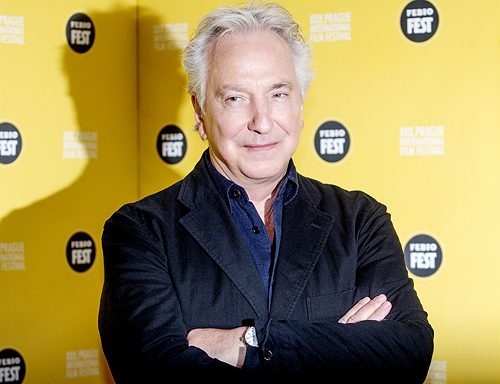“I have to defend myself when I get labelled as a Snape,” Rickman says.
March 22, 2015
Alan Rickman brought his film “A Little chaos” to Prague. Since he was the director, he played a small role in the film, but the role of King Louis XIV. The popular actor does not like the image of the eternal negative hero, including Snape, so he talks with pleasure about his current work.
Sixty-nine-year-old British Alan Rickman is one of the biggest stars of this year’s Febiofest. The actor, who became famous for his roles in the films ‘Love actually’, ‘Robin Hood: Prince of Thieves’, ‘Die hard’ and the Harry Potter series, brought his second directorial effort to the 22nd annual film festival in Prague. Kate Winslet plays the lead role in the period drama ‘A little chaos’, set in the 17th century French royal court, while Rickman played only a minor role as King Louis XIV.
The popular actor is very unhappy that film fans have pigeonholed him as a typical villain. When asked at a press conference how he decides whether to accept the role of a villain or not, he first roasts the inquiring journalist with his typical “villainous” look and then subjects him to questioning. “How many characters like that do you think I’ve played? You say six or seven? I think two and a half at most. And that was twenty-eight years ago.”
Who was the semi-villain?
One was kind of indecisive. I played Ronald Reagan once. When you’re preparing for a role at home, you often learn all sorts of things about it. Nothing is black and white.
It sometimes happens to actors that even though they have dozens of roles to their credit, they are always associated with only one. What is your current relationship with Professor Snape from Harry Potter?
I think I’m doing more films. I’m obviously very proud of the whole series, it was a good effort, but I guess I’m not as identified with Snape as Ralph Fiennes is with Voldemort. And I think Daniel Radcliffe is doing quite well in his other career. I understand why people try to put us in a box, but you have to resist that.
How did you prepare for the role of Louis XIV? Did you study his character?
I prepared at home, in the evenings I studied books about him. It is difficult to portray someone who was such a powerful man in the past. He could take anyone out of the world with a snap of his fingers.
What do you think he was like? In the film, you portrayed him as a friendly, nice guy.
What struck me about the script was that when he wanted to get rid of the weight of his identity for a moment, he would disappear to a chosen place. Apparently, that really happened. It’s an interesting motif, to suddenly see who the man behind the mask of a powerful man really is. Because there must have been someone behind it. Someone with ordinary human needs.
Louis XIV. finally ended his life as an ascetic after all those years of wars and spending.
Of course, we couldn’t tell his whole story. But one of my acquaintances said after watching it: “God, how lonely he was.” All that Louis surrounded himself with was a beautiful, amazing garden and beautiful people who constantly danced around him like some kind of figurines. But for her, it was a picture of despair and loneliness.
So what about the story of The King’s Garden appealed to you the most?
The relationship between the king’s garden architect André Le Nôtre and the gardener Sabine De Barra. A complex love story between two completely closed people. First they have to find themselves and then they come together. So it’s not about a historical time or place at all. Such a story could happen at any time and in any country.
This is your second film you have directed. You made your first one almost twenty years ago. Where do you get your motivation to make it?
The motivation is always the same. However, I have also directed in the theatre in the meantime. For example, I first prepared my first film, The Winter Guest, as a play. I originally studied graphic design and only started studying acting when I was twenty-five. I am a big supporter of young people not having to decide on their profession too early. When I then directed The Winter Guest as a film, it seemed like the ideal combination of my sense of art and my acting training. As a director, you have to have a lot of self-confidence to be able to stand in front of actors and be able to say “I don’t know” when they ask you something.
Why did you choose such a challenging topic as period costume drama?
In short, you get a script that appeals to you in such a way that you won’t let it go until you finish reading it. It’s some kind of animal instinct. The story simply chooses you. Sometimes we spend our lives thinking unnecessarily. And it’s good to gain experience with something that you haven’t thought through at all, something you went into instinctively like an animal. That’s what actors do, and in a certain sense, directors do too. For example, when you read a script like this, where you have that decisive: “Yes, I want to do that!” Or: “No, definitely not this!” Whether I can tell whether it’s well written or not is also often not connected with any rational decision. As soon as images start to creep up on you from the text, it has something to do with that instinctive part of your personality. It probably manifests itself more in actors than in directors.
How difficult is it to both direct and act in a film?
Terrible. Schizophrenic. Actors now often act in films they direct. They even have leading roles. I don’t understand how they do it. I’m only in the film because the producer told me to. I’m not such a fool as to cast myself. When you’re both a director and an actor, it means you’re acting for free. Fortunately, my character isn’t in the film much, and when he is, he’s either standing or sitting and pretending to be a director. It’s a shame that there wasn’t film back then in the seventeenth century, Louis XIV would have loved to direct.
The number of actors directing is increasing. Why?
And why not? They come with some knowledge. Even Orson Welles was once a producer, director and actor. And when his costumes didn’t arrive, he was able to sit down at midnight and prepare them from a sheet. Let’s be glad that you have such creative fools. If Orson Welles or Woody Allen could do it once, why can’t someone today.
Do you have any advantage as an actor in directing?
Not necessarily. There have been a lot of great directors who would have had a hard time acting. It’s just a matter of your imagination.
What was your favorite scene to shoot?
I don’t know what your favorite was, but I have scenes that I was relieved to shoot. When you read in the script that there’s going to be a carriage accident, you think – are we going to destroy a real carriage? How many are we going to need? And then I woke up one night and thought: “Wait, if we have a carriage, we have to have two horses and a coachman. And we can’t have them overturn with the carriage, the audience would be worried about them.” So then you have to think about how the horses escape and the coachman jump out so that the audience doesn’t focus on them. Once a scene like that is done, I feel relieved.
Your film opened Febiofest, in the introduction you consistently pointed out that the film is not historical. But it seems very realistic. Why do you care so much about the word historical?
If we wanted to be historically accurate, a woman could not have held such a position at that time and the architect Le Nôtre would have been seventy. But we wanted the story to seem believable, so we are just using history.
Kate Winslet’s gardener brings a little chaos to Louis’s company and his meticulous plans (A Little Chaos is the official title of the film – ed. note). Have you experienced anything like that on set?
Set-up is like a marketplace of ideas, someone suggests something, someone rejects it. There can be chaos and order in it. And like in any work of art, it needs to be balanced somehow. I love chaos and order, it depends on what you need at the time.
At the press conference before the festival, you lamented that few people go to the cinema these days. Everyone prefers to watch TV or the computer. Is there any way to stop this trend?
Scriptwriters now prefer to work for television because they see more potential there. And today’s children never take their eyes off their iPhones. I saw that yesterday on Charles Bridge, instead of looking at Prague, they stare at cameras and take selfies. Now even on poles. “Here I am, here you are.” It’s all about this. “Here is my message, here is yours. And now I’m writing to you that I’m writing to you. Oh, you’re writing to me right now…” If only they would look at the buildings around them and find out where they are. I think it’s a shame. I love the feeling when three hundred people come together in a cinema, they’re not looking at their phones and you can tell them a story. The energy, all those people in one room. It’s something completely different than sitting at home with your dad, mom, and sister, the phone rings halfway through, and you can stop the movie at any time.
Do you think this is the beginning of the end of the big screen?
All I know is that more and more independent films are moving to television and it’s getting harder and harder to get the money to make something for the theater. At the same time, the big studios are making movies where superhero follows superhero. Those are just facts.
Would you be interested in making a TV series?
I don’t know. That brings us to one of your first questions. I just read the script page by page and decide whether to say yes or no. With The King’s Garden, I wasn’t drawn to the seventeenth century, I was drawn to the story. So it’s possible that I’ll like something and then find out it’s a TV series. If it’s good enough to keep viewers from making coffee or constantly checking their phones, then maybe someday. I don’t know.



